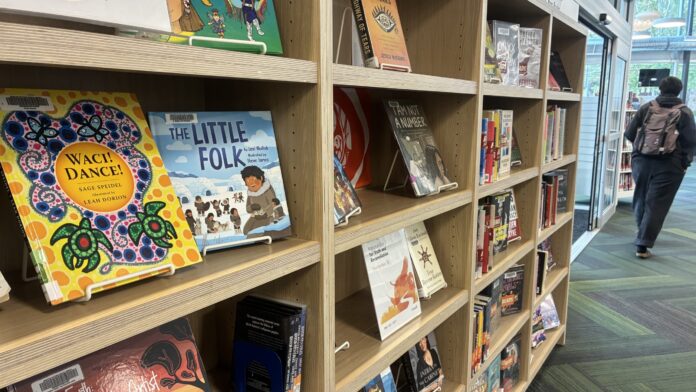Library directors and advocates in British Columbia say they are disappointed after Premier David Eby ruled out increased funding for libraries in the near future.
Eby told delegates at the end of last week’s Union of B.C. Municipalities convention there is no room in the provincial budget to raise annual library funding, but said the issue remains on the government’s “radar.”
“When we’re able to, we’ll make sure that there is consistent funding going forward for libraries in the province, because I understand the importance of that,” said Eby.
The UBCM passed a resolution on Sept. 24, calling on the province to more than double library funding to $30 million. The resolution also urged the province to establish a dedicated capital funding program to assist local governments in upgrading, expanding, and constructing library facilities.
“While Premier David Eby’s answer was a no, it shows us exactly where the next decisions have to be made,” said Cari Lynn Gawletz, chair of the Association of BC Public Libraries and the director of the Grand Forks and District Public Library.
“If the province won’t move right now, then local governments have to decide what kind of library service their communities will have, because that’s where libraries will be made or broken,” she said.
A 2023 snapshot of B.C. libraries shows there were 1.9 million active cardholders and 1.3 million people attending library programs each year. The province currently provides $14 million in annual funding that is shared between all 71 public library systems.
Gawletz said the provincial funding accounts for between five and 15 per cent of library budgets, with the majority provided by municipal governments.
The last time B.C. made a change to its annual library funding was in 2009, when it decreased funding from the previous $17 million per year.
“A funding freeze that lasts for 15 years is in real terms a year-over-year funding decrease, because things are getting more and more expensive,” said Gawletz.
As a result, she said, libraries have had to reduce hours, cut programs and buy fewer books.
At the same time, Gawletz acknowledges libraries have also risen to the frontlines of the homelessness and addictions crises in the province.
“Our staff have the unique opportunity to see gaps that are in our society really early,” she said. “Staff are operating more in a social services capability than they have historically.”
Gawletz said burnout is common among library staff who are dealing with people with addictions and mental health issues, on top of their regular duties.
“When you’re a front desk circulation clerk, you are going to be dealing with some challenging situations at the same time as you’re also trying to help a kindergartner find books about unicorns,” she said.
Gawletz said libraries offer de-escalation and other training, but she said training can only go so far.
“A lot of the issue is that there just aren’t enough people at any given time to deal with the volume of issues that we’re dealing with, and that is just because it’s a funding issue,” she said.

Dan Hackborn is a PhD student at the University of British Columbia and a member of the B.C. Library Association Climate Action Committee. He noted libraries also serve as important respite and fresh air centres during extreme weather and wildfires, which are becoming more frequent due to climate change.
He says many B.C. libraries also have sustainability initiatives that go above and beyond their traditional services. He said Surrey Libraries was the first in Canada to achieve a Sustainable Library Certification.
“However, dedication, creativity, and grit really only goes so far,” said Hackborn. “Like housing and addictions, these are significant additional responsibilities on top of the traditional commitments that libraries have, like access to knowledge and intellectual freedom, and there hasn’t been an appropriate level of stable resourcing to support libraries in addressing these challenges.”
Hackborn said in a survey conducted for the B.C. Library Association, libraries commonly said they struggled to maintain adequate building temperatures due to aging facilities, such as HVAC systems that hadn’t been upgraded for 30 years.
“Which is not not ideal if you’re being designated as a cooling centre for the public,” he said.

B.C. Housing and Municipal Affair Minister Christine Boyle acknowledged the challenges libraries are facing.
“We recognize the pressures facing libraries as community hubs and understand that local decisions about service levels in a community are challenging to navigate,” said Boyle in a statement. “Libraries are critical to our communities, and we remain committed to working with library leaders and local governments to ensure public libraries can continue to meet the evolving needs of British Columbians.”
Her ministry said that since 2020, the province has invested an additional $56 million in direct support to communities and library boards in addressing rising service costs and ensuring continued access to vital resources. That includes a one-time $45 million grant in 2023 to be spent over three years.
The ministry also notes that some communities have allocated infrastructure money from the $1 billion Growing Communities Fund towards capital projects like libraries.
Gawletz said the grant funding has helped libraries “patch up the cracks,” but for many it’s not near enough to maintain their level of services.
“It’s local government funding that is going to be the make or break as far as library operations continuing or being reduced in coming years, and we kind of feel like in libraries that our funding is being treated like a bit of a hot potato by different levels of government,” she said.
“Libraries run on resources, not rhetoric. And without real investment, the services people depend on every day will simply disappear,” said Gawletz.






